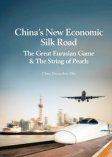Getting Functionality Into The Belt & Road Initiative: A Personal Experience
Op/Ed by Chris Devonshire-Ellis
One of the perils of constantly travelling and researching China’s Belt & Road Initiative is functionality. Regular readers of this increasingly popular (and relevant Silk Road Briefing website) will note I have been somewhat quiet the past couple of weeks. Having travelled from Moscow across Uzbekistan, Turkmenistan, Pakistan, India and now to Sri Lanka the vast nature of China’s ambitions come home to roost. Although at Dezan Shira & Associates I am supported by several hundred staff across our offices throughout Asia, even they are powerless in the absence of regular power cuts, downed communications, and a laptop whose power supply connection broke. Hence the related lack of recent articles the past few days.

My travel troubles aside, these issues do bring home, first hand, what a boom – and challenge – China’s Belt & Road Initiative is going to be. Difficult Terrain? Check. Failing Infrastructure? Check? Lack Of Resources? No Support? Check. Try dealing with scheduled power cuts from between 2pm to 6pm and from 8pm to 10pm and you’ll soon learn to get everything you need done via communications early in the morning. After that, there’s no communications, no internet, and annoyingly, no aircon or cold beer. The trouble is, early morning is also the best time to be on the road, when its not yet so hot and dusty. And try getting either a replacement Dell laptop power socket (or even a new laptop). Firstly, the nearest one is in a different city 150km away (plenty of Chinese Lenovo though) and secondly, paying for a relatively expensive piece of kit when there is no power is kinda hard. Cash is king, and I don’t carry enough to buy a laptop. Neither do ATM’s work in outages. Business Centres are non-existent and available generators used for emergency services or production, not typing Silk Road Briefing articles. No tourists, not even backpackers, visit some of the recent places I’ve been too.
These shortcomings are par for the course and I have no complaints. What it does demonstrate however is how important China’s Belt & Road Initiative is for Central and parts of South-East Asia. A large part of China’s Belt & Road will be to sort these problems out. Russia will be a big player in this too. Of course, the West has long had the opportunity to do this – the British Great Game and the Soviet Union all left infrastructure marks, although these are decaying now, and in any event technology has moved on. The United States meanwhile has seemed to corrupt the “leave nothing but footprints” mantra across the region to “leave nothing but bullets.” A resurgent Russia, pushed by the Wests sanctions is now rediscovering it’s Soviet past and re-engaging with the region via the Eurasian Economic Union and new investments – this time in energy, communications and hi-tech. China is taking on the old Soviet task of re-engineering it with heavy duty infrastructure build courtesy of its construction and energy SOEs. On top of that, supplies of domestically made support and supply systems – from those Lenovo’s everywhere to electronics, autos, and even food and water.
I eventually got a new Dell, once back in the relevant luxury of Colombo, Sri Lanka’s capital, having returned to my Sri Lanka home yesterday. But for all points inbetween, the lack of resources is exactly what has attracted China in the first place. Having built an extremely technologically difficult railway from Beijing to Lhasa, way back in 2006, it is easy to see that now as the spark that lit the Belt & Road Initiative. In five years time I doubt I will experience the travails I just have. Is China’s Belt & Road Initiative a good thing? A quick poll taken of everyone living west of Xinjiang as far as the Balkans, south to Indonesia and to the far arctic north would, I suggest, confirm that as a positive. Getting functionality into Central and South-East Asia is very much a China style challenge – and one that it appears up to taking on with increasing confidence.
About Us
Silk Road Briefing is produced by Dezan Shira & Associates. Chris Devonshire-Ellis is the practice Chairman. The firm has 26 years of China operations with offices throughout China, Asia and Europe. Please refer to our Belt & Road desk or visit our website at www.dezshira.com for further information.
 Related Reading:
Related Reading:
![]() China – The Great Infrastructure Developer
China – The Great Infrastructure Developer
![]() China-Russia Great Eurasian Partnership on Development Track as EAEU Agree to Regional Free Trade
China-Russia Great Eurasian Partnership on Development Track as EAEU Agree to Regional Free Trade
China’s New Economic Silk Road
This unique and currently only available study into the proposed Silk Road Economic Belt examines the institutional, financial and infrastructure projects that are currently underway and in the planning stage across the entire region. Covering over 60 countries, this book explores the regional reforms, potential problems, opportunities and longer term impact that the Silk Road will have upon Asia, Africa, the Middle East, Europe and the United States.






